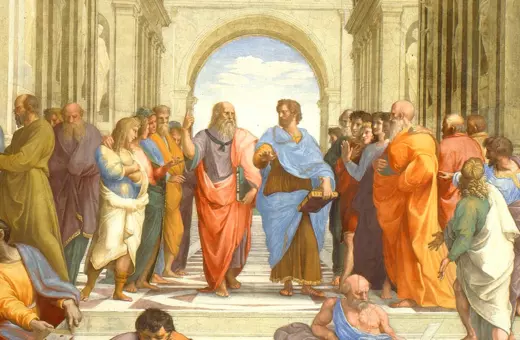We find similar ideas of a transcendent ego in both Kant and the Upanishads. We find a rejection of free will in Schopenhauer and Ramana Maharshi. What should we make of this overlap between Western and Indian philosophy? Chakravarthi Ram-Prasad argues both became gripped by the same question.
Ricky Williamson: What do you think are the key differences and similarities between Western and Indian philosophy?
Chakravarthi Ram-Prasad: I don’t think that there is actually a global answer to the question of differences between what are, broadly speaking, historically constructed traditions. While we might intuitively think we recognise what Western philosophy is or what Indian philosophy is, in practice it’s more complicated.
A particularly potent example of the difficulty is the question of whether Arabic philosophy counts as Western philosophy. We know that the whole Aristotelian tradition was lost to the Latin-writing European philosophical tradition and was preserved by the Arabs and in Arabic. It only returned to the European tradition in the Renaissance, which launched a whole series of rediscoveries of Greek materials. Some people have therefore argued that Arabic philosophy is part of Western philosophy. But others would point out that within Islamic thought, as it was articulated in Arabic, Persian or Turkish, there was such a thing as Falsafah, which was a particular branch of philosophy and which was integrated into questions that were doctrinally based on Islamic revelation. So, they would conclude, of course what we might call Arabic philosophy is nothing like Western philosophy.
___
Schopenhauer is not a reliable guide to the Upanishads.
___
So we end up having these kinds of issues. I would suggest, then, that we should think instead about the different particular ways in which ideas arose in different places and periods. For example, the same sorts of ideas arose with the Greeks, were articulated by the Romans, and then were rediscovered after the Christian medieval period in Europe, and persisted into the contemporary divergence between Anglophone and European philosophy. When you look at this welter of ideas, you’ll find places in which there are similarities and overlaps with the classical Indian traditions, which we might see as beginning with the early Sanskritic Vedic materials in the Upanishads, and then continuing through the Buddha, Jainism, the creation of the different Buddhist schools of thought, right up to the premodern period and the rupture with the coming of colonialism.
 SUGGESTED READING
How Western Philosophy Became Racist
By Lloyd Strickland
SUGGESTED READING
How Western Philosophy Became Racist
By Lloyd Strickland
There are some specific issues where the so-called Western and Indian traditions come quite close to each other. This is the case, for example, with respect to problems of perception and questions about the relationship of causation and knowledge. Indeed, Western and Indian philosophers who address these questions are often closer to each other than they are to their colleagues who address different issues, such as the transformation of consciousness or the relationship between God and human. So it just depends. I would rather consider questions about particular areas of convergence and divergence than give global answers about the relation between the so-called Western and the so-called Indian tradition.
RW: That’s fascinating, and we will come on to such questions. Firstly though, out of interest, were Indian and Western philosophical traditions communicating with each other at their foundations, or were they completely separate at that time? If they had separate origins, when was the first communication between the two? Obviously, Schopenhauer was influenced by Indian philosophy. I wonder about other crossovers, and when they first happened.





















Join the conversation